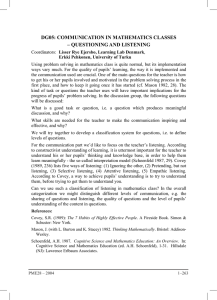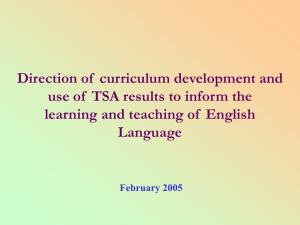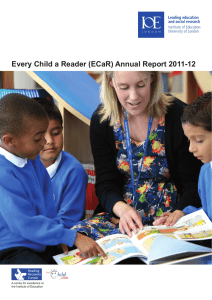Responsibility statement - English. Literacy refers to the skills that
advertisement
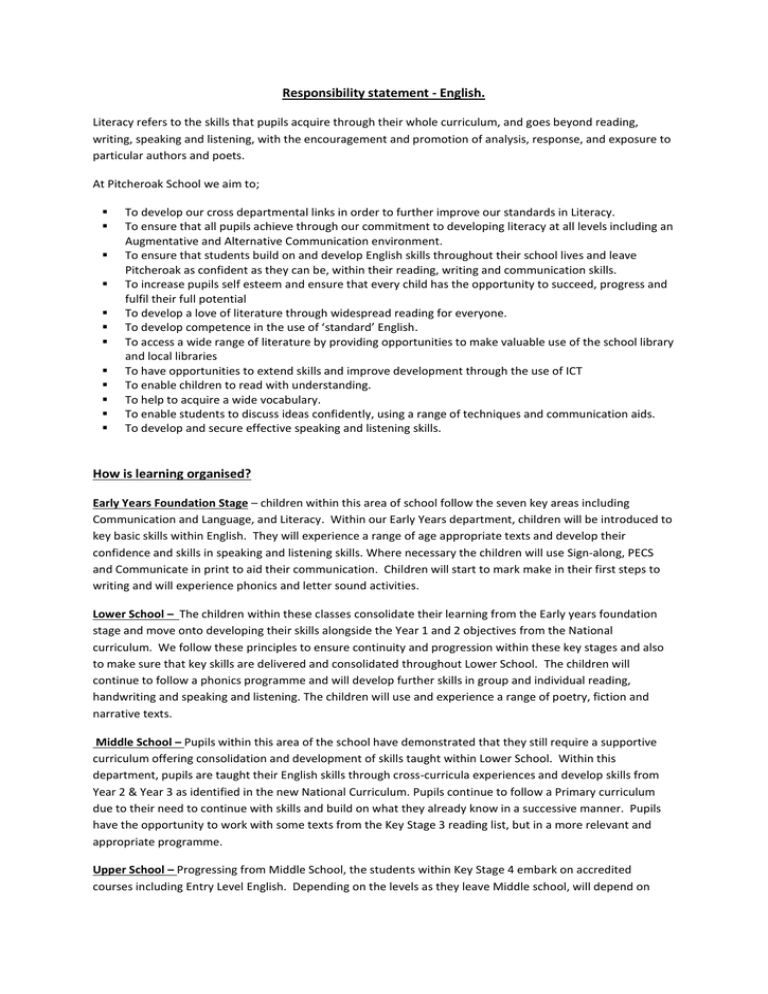
Responsibility statement - English. Literacy refers to the skills that pupils acquire through their whole curriculum, and goes beyond reading, writing, speaking and listening, with the encouragement and promotion of analysis, response, and exposure to particular authors and poets. At Pitcheroak School we aim to; To develop our cross departmental links in order to further improve our standards in Literacy. To ensure that all pupils achieve through our commitment to developing literacy at all levels including an Augmentative and Alternative Communication environment. To ensure that students build on and develop English skills throughout their school lives and leave Pitcheroak as confident as they can be, within their reading, writing and communication skills. To increase pupils self esteem and ensure that every child has the opportunity to succeed, progress and fulfil their full potential To develop a love of literature through widespread reading for everyone. To develop competence in the use of ‘standard’ English. To access a wide range of literature by providing opportunities to make valuable use of the school library and local libraries To have opportunities to extend skills and improve development through the use of ICT To enable children to read with understanding. To help to acquire a wide vocabulary. To enable students to discuss ideas confidently, using a range of techniques and communication aids. To develop and secure effective speaking and listening skills. How is learning organised? Early Years Foundation Stage – children within this area of school follow the seven key areas including Communication and Language, and Literacy. Within our Early Years department, children will be introduced to key basic skills within English. They will experience a range of age appropriate texts and develop their confidence and skills in speaking and listening skills. Where necessary the children will use Sign-along, PECS and Communicate in print to aid their communication. Children will start to mark make in their first steps to writing and will experience phonics and letter sound activities. Lower School – The children within these classes consolidate their learning from the Early years foundation stage and move onto developing their skills alongside the Year 1 and 2 objectives from the National curriculum. We follow these principles to ensure continuity and progression within these key stages and also to make sure that key skills are delivered and consolidated throughout Lower School. The children will continue to follow a phonics programme and will develop further skills in group and individual reading, handwriting and speaking and listening. The children will use and experience a range of poetry, fiction and narrative texts. Middle School – Pupils within this area of the school have demonstrated that they still require a supportive curriculum offering consolidation and development of skills taught within Lower School. Within this department, pupils are taught their English skills through cross-curricula experiences and develop skills from Year 2 & Year 3 as identified in the new National Curriculum. Pupils continue to follow a Primary curriculum due to their need to continue with skills and build on what they already know in a successive manner. Pupils have the opportunity to work with some texts from the Key Stage 3 reading list, but in a more relevant and appropriate programme. Upper School – Progressing from Middle School, the students within Key Stage 4 embark on accredited courses including Entry Level English. Depending on the levels as they leave Middle school, will depend on whether the students are working at Entry Levels 1, 2 or 3. (Equating to National Curriculum Levels 1, 2 or 3). This course is worked on over the 2 years that the students are in Key Stage 4. Post 16– In Post 16, students continue to work on their English skills in a way that is relevant to their lives post school. They build on the key skills within English, such as reading signs and labels in shops and their everyday environments, they write for purpose and learn to fill in forms, write cv’s and letters and they develop their speaking and listening skills when learning to work with others and prepare for interviews. How is this achieved? Pitcheroak works closely with speech and language team in order to further develop effective communication skills. Children are assessed using B2 assessment tool, this is used to monitor progress and highlight areas of development. Writing asessments are completed every term to assess progress and highlight areas of development. This procress gives staff the opportuntity to moderate work and develop a secure understanding of assessment levels. Reading assessments also completed each term to monitor progress. This information guides reading groups across lower and middle school. Morning time is used productively and time is spent focussing on specific skills. Children have the opportunity to access a broad curriculum and range of experiences and an enriched curriculum.
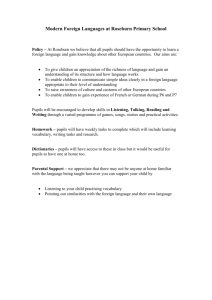
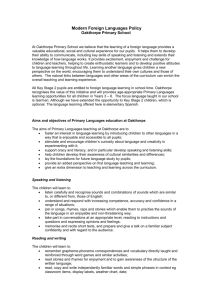


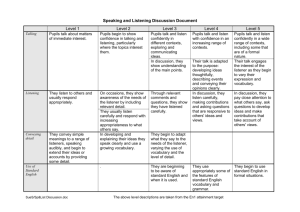

![afl_mat[1]](http://s2.studylib.net/store/data/005387843_1-8371eaaba182de7da429cb4369cd28fc-300x300.png)
